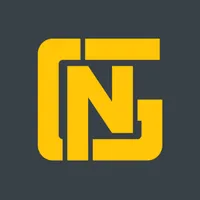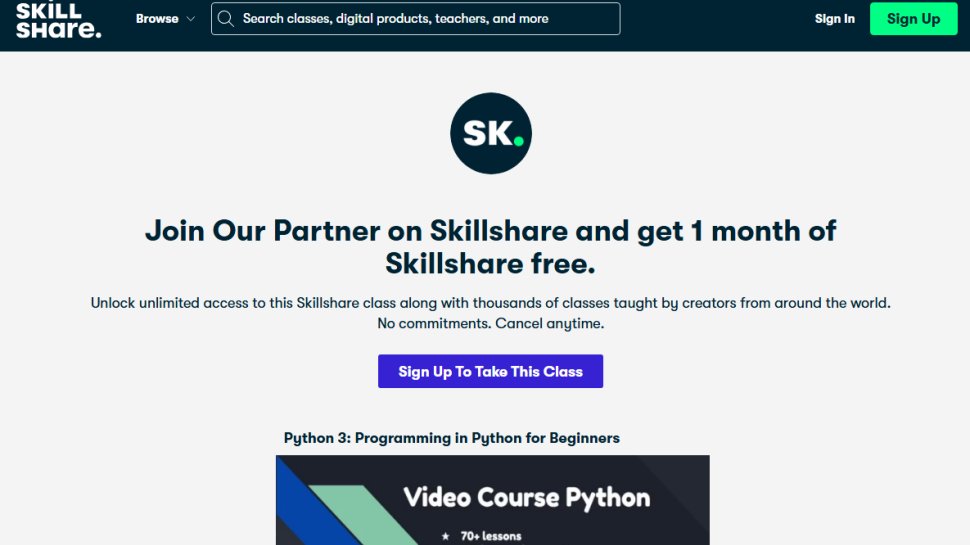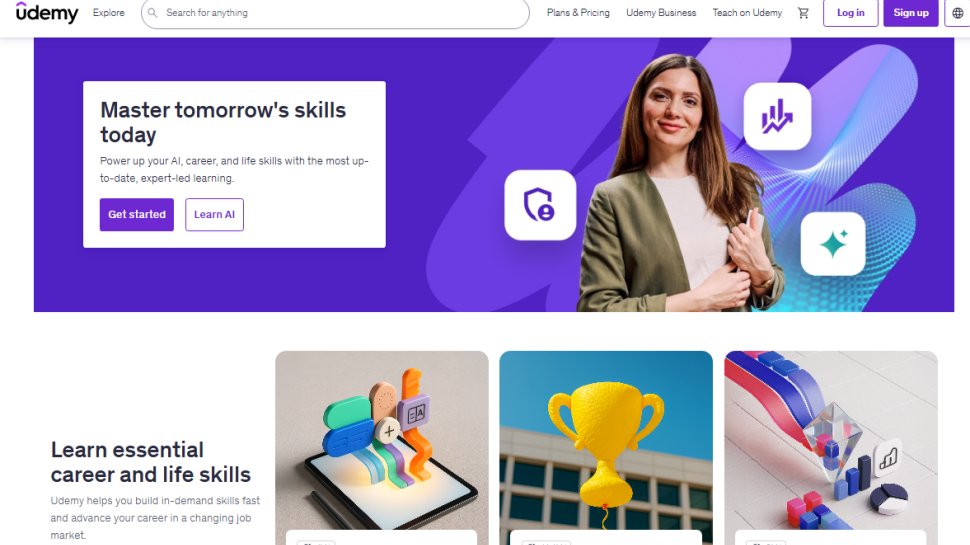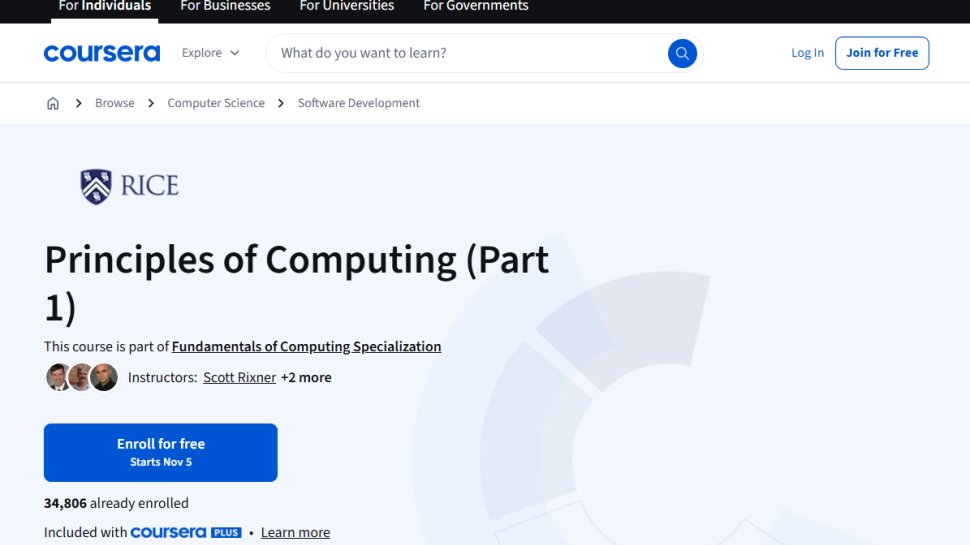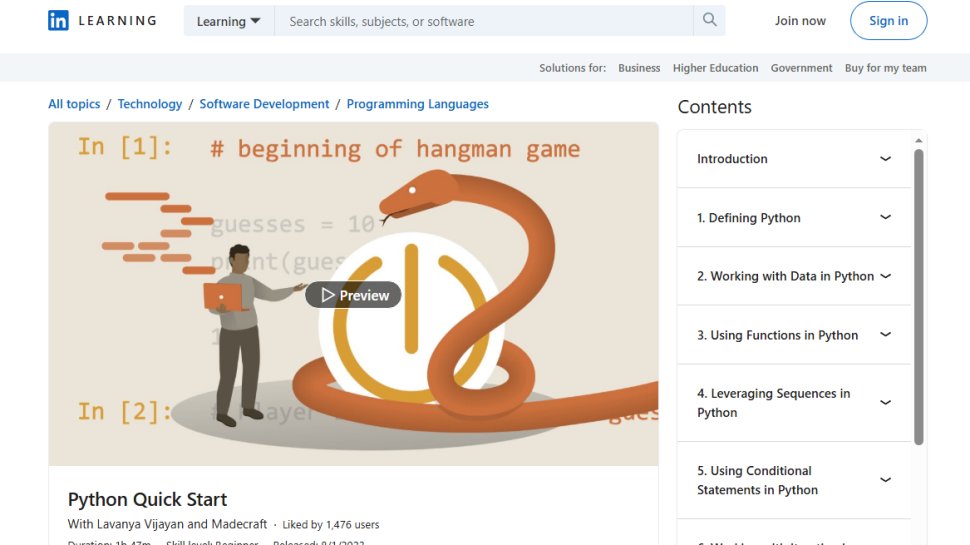Best Python online course of 2025
Improve your Python programming

We list the best Python online courses, to make it simple and easy for coders of various levels to evolve their skills with accessible tutorials.
Python is one of the most popular high-level, general-purpose programming languages. Named after the comedy troupe Monty Python, the language has a user-friendly syntax that makes it very appealing to beginners. It’s also very flexible and scalable, and has a very vibrant, global community of users.
Thanks to its rich set of tools and libraries you can use Python for just about anything -- from web development and data analysis to artificial intelligence and scientific computing.
According to the TIOBE Index, Python is currently the most popular programming language in the world. In fact, Python is used in some form or the other in virtually all major tech companies around the world, which makes it one of the top-most demanded skills.
If you want to work with Python scripts, you'll need a text editor suitable for coding and an Integrated Developed Environment (IDE) to run them.
We've judged these Python online courses across various parameters, like their pricing plans, the simplicity of their tutorials, the quality of learning support they offered, and what user level they were aimed at. We also evaluated the pace of the courses, the number of learning resources they had, and whether provided useful features like subtitles.
So whether you are new to Python or to programming itself, here are some of the best Python online courses to help you get to grips with the language.
We've also featured the best laptop for programmers.

Recommended cybersecurity course
Why you can trust TechRadar
NexGenT - career-focused courses for cybersecurity students
One of the best online cybersecurity courses we've seen is by NexGenT. It offers beginner and advanced IT courses and a unique payment plan: $0 up front with payment once you’ve started your career. Its self-guided programs and platforms won’t appeal to everyone but if you’re serious about a job in cybersecurity, this may be the right option for you.
The best Python online courses of 2025 in full:
Best Python online course for beginners
Reasons to buy
Reasons to avoid
Skillshare offers several Python tutorials aimed at beginners, but very few are as comprehensive as "Programming in Python for Beginners". The Instructor has designed the course with the assumption that the students have absolutely no clue about programming. He’ll help you get started by setting up your Python development environment in Windows, before explaining all the basic constructs in the language and when to use them.
The course is made up of over 70 lessons for a total runtime of over 11 hours. The lessons will help you learn how the various arithmetic, logical and relational operators work and understand when to use lists, collections, tuples, dictionaries. The primer on functions is pretty usable as it shows you how to avoid common mistakes. The course also touches on some advanced topics like measuring the performance of your code to help write efficient code. There’s an exercise after every few lessons that’ll challenge you to put the newly acquired skills to solve a problem.
Note however that the Polish instructor has an accent, which didn’t bother us but your mileage may vary. Plus we liked the instructor’s engaging diction that made the course really interesting. He also actively engages with students in the discussions page on the course to clarify any doubts and share feedback on the exercises.
In terms of delivery, SkillShare has a rather vanilla player as compared to some of its peers. It does give you the ability to alter the play speed and add notes, but the lack of support for closed captions is disappointing. SkillShare offers a Free trial during which you can take any course in their library including this one.
Read our full SkillShare learning platform review.
Best Python online course for advanced users
Reasons to buy
Reasons to avoid
Udemy offers a wide range of excellent courses, but their course, "The Python Mega Course: Build 10 Real World Applications", will be especially good for those who know some Python already. As its name suggests, the course teaches you how to build 10 practical apps using Python, from simple database query apps to web and desktop apps to data visualization dashboard, and more.
The instructor uses the Visual Studio Code IDE in the course that has over 250 videos divided into 33 sections. The first 8 sections cover the fundamentals of Python and another four cover advanced topics before you get to coding the 10 examples in the remainder of the course.
Many of the example apps are preceded by a section or two that teach the crucial elements in the example. For instance, before you build a desktop database app, you’ll learn how to use the Tkinter library to build GUIs and also how Python interacts with databases, particularly, SQLite, PostgreSQL and MySQL. The video lessons are supplemented by coding exercises and quizzes, and there’s also a Q&A section to post your questions to the instructor.
You can pay for the course once on Udemy to get lifetime access. The instructor regularly updates the course and once you’ve bought the course you’ll get these modifications for free. The learning experience is further enhanced by Udemy’s player, which is one of the best in the game. In addition to altering the playback speed, it’ll help you place bookmarks in the lectures.
To help you find areas of interest, it’ll also display popular locations bookmarked by other students. You also get closed captions in over a dozen languages and can even view an auto-scrolling transcript of the lessons. Furthermore, Udemy’s smartphone app has the option to download a lesson to the device for offline viewing.
Read our full Udemy learning platform review.
Best Python online course overall
Reasons to buy
Reasons to avoid
Coursera is another of our favorite online learning resources, and their "Principles of Computing" is a good course to expand your coding skills with Python. It's presented in two-parts and is offered by Rice University as part of the Fundamentals of Computing Specialization, which has a total of seven courses. The courses divide the lessons across several weeks, each of which has multiple video lectures, readings, practice exercises, homework quizzes, and assignments.
They are conducted by three Computer Science faculty members of Rice University and will upgrade your basic Python skills to help you think like a computer scientist. The courses introduce mathematical and computational principles, and how you can integrate them to solve complex problems, to enable you to write good code.
Coursera has a nice video player that offers closed captions and transcripts. You can also take notes at any point during the video lecture. Best of all you can download the video lectures in MP4 format as well as the subtitles and transcripts for offline viewing. You can audit the courses for free or earn a specialization certificate by subscribing to the service.
Read our full Coursera learning platform review.
Best Python online course for busy people
Reasons to buy
Reasons to avoid
LinkedIn Learning offers a great range of professional development courses, and the course, "Advance your career with Python", is no different.
This course is designed for someone who has limited time and it’s ideal for you if you want a fast paced introduction to Python. The instructor uses the Anaconda distribution of Python and writes code in Jupyter Notebook. She doesn’t skip over any of the building blocks of the language and her lessons are nicely paced and well illustrated.
The good thing about the course is that instead of straightaway diving into coding a construct, which many fast-paced introductory courses do, the instructor begins each lesson by explaining the construct and its use. The course ends with a quick introduction to object-oriented programming.
LinkedIn Learning’s video player supports closed captions and you can also get a transcript for the course that you can use to jump into the lecture. The service also offers a free 1-month trial, which should be more than enough to take this course.
Read our full LinkedIn Learning review.
Best Python online course for data science
Reasons to buy
Reasons to avoid
edX provides an excellent range of free-to-access courses, and their "Analyzing Data with Python" course could be a great way for those with some Python coding skills to really break out into the wider field of data science.
This course equips you with all the skills you need to crunch raw data into meaningful information using Python, and will familiarize you with Python’s data analysis libraries including Pandas, NumPy, SciPy, and scikit-learn.
The self-paced course is divided into five modules with the sixth being the final assignment. Each module begins with a summary of the concepts that it’ll impart before it introduces the libraries and how they’re used to achieve the specified objective. There are quizzes and lab exercises to help you put the newly acquired knowledge to use.
The videos have closed captions as well as English transcripts that you can use to jump into the video. The course is conducted by IBM and requires you to put in 2-4 hours a week for five weeks. You can get a verified certificate if you score over the specified minimum marks for the various exercises and quizzes.
Read our full edX learning platform review.
We've also featured the best Linux learning providers.
Best Python online courses FAQs
What are Python online courses?
Python online courses are educational programs that teach users about Python, a high-level programming language.
Python is not too difficult to learn and is generally used to develop websites and software, among other things.
How to choose the best Python online courses for you?
When deciding which of the best online Python course to use, first consider what level of competency you are currently at. If you've not learned Python and you've little experience with other programming languages then it would definitely be recommended to start with the beginner courses, as these will break you into the basics you'll need before you cover more advanced tools.
However, if you already have a decent amount of programming experience, especially with Python, then feel free to try your hand with the more advanced courses.
How we tested the best Python online courses
To test for the best online Python courses we searched for a range of popular options as well as took recommendations from people we know who are learning Python or who are already competent with it. Then we followed the tutorials to get an idea of how easy they were to follow, how easy it was to learn essential tools and processes, and additionally what sort of user level the courses were aimed at, such as beginner, medium, or advanced-level users.
Read how we test, rate, and review products on TechRadar.
More online programming courses:
Get in touch
- Want to find out about commercial or marketing opportunities? Click here
- Out of date info, errors, complaints or broken links? Give us a nudge
- Got a suggestion for a product or service provider? Message us directly
- You've reached the end of the page. Jump back up to the top ^
Sign up to the TechRadar Pro newsletter to get all the top news, opinion, features and guidance your business needs to succeed!
With almost two decades of writing and reporting on Linux, Mayank Sharma would like everyone to think he’s TechRadar Pro’s expert on the topic. Of course, he’s just as interested in other computing topics, particularly cybersecurity, cloud, containers, and coding.
